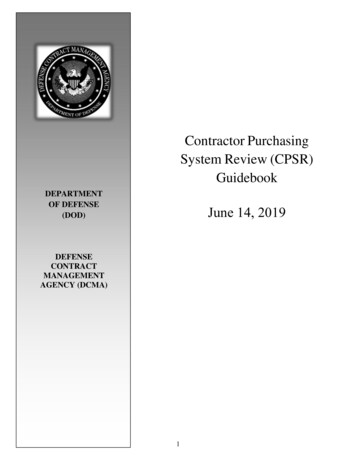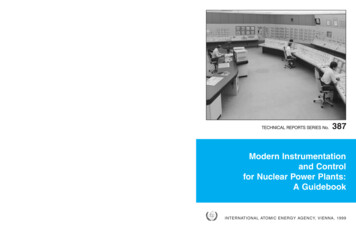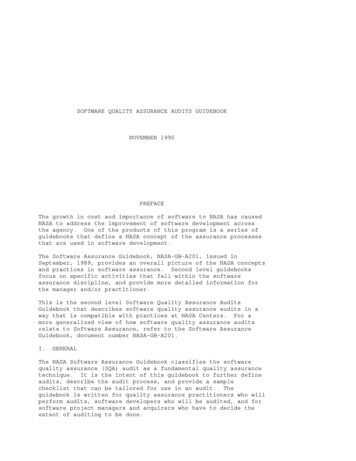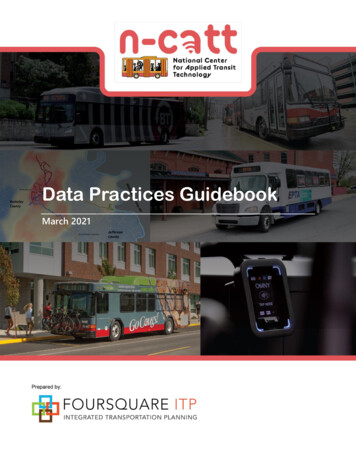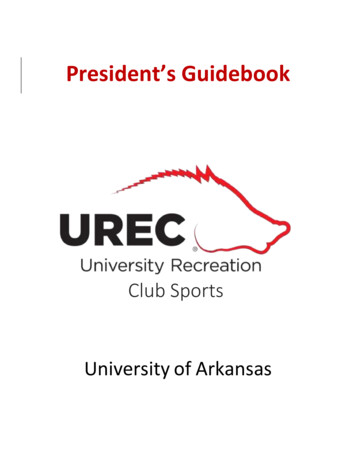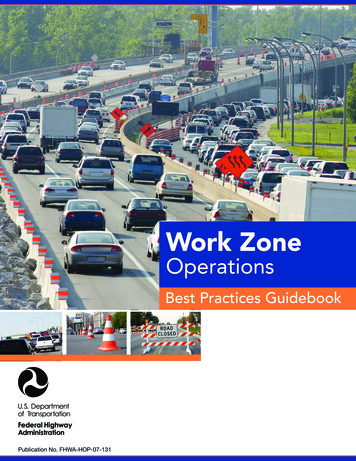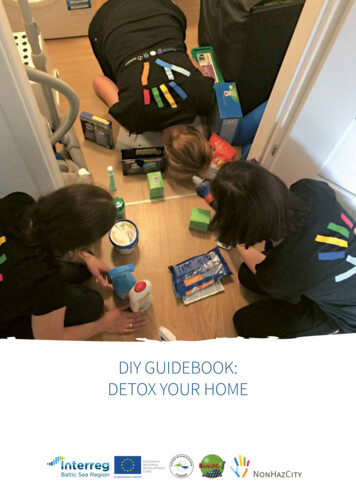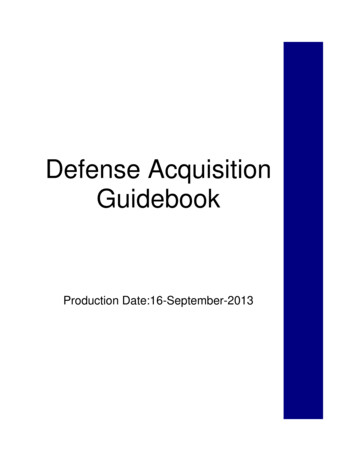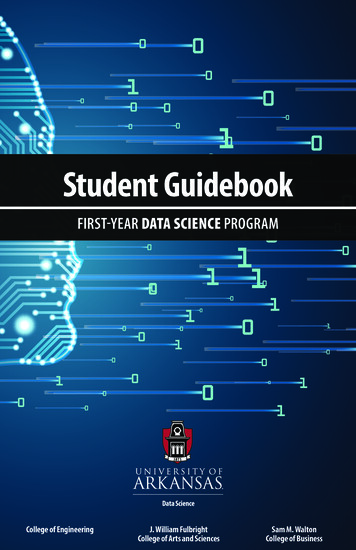
Transcription
Student GuidebookFIRST-YEAR DATA SCIENCE PROGRAMCollege of EngineeringJ. William FulbrightCollege of Arts and SciencesSam M. WaltonCollege of Business
First-YearData ScienceProgramDirectoryJBHT 110-111Fayetteville, AR 72701datasci@uark.eduDr. Manuel D. RossettiDirectorrossetti@uark.eduThis guidebook will þ Teach you about theFirst-Year Data ScienceProgram (FYDS)Dr. Karl D. SchubertAssociate Directorschubert@uark.eduLee ShoultzProgram Managereshoultz@uark.eduþ Provide informationto prepare forone-on-one advisingþ Be a resource afterorientationStill have questions þ Students shouldcontact Data Scienceby sending an emailfrom their UARKaccount todatasci@uark.edu
Table of ContentsFirst-Year Data Science Program Overview . . . . . . 2First-Year Data Science (DASC) Courses . . . . . . . 3Peer Mentoring Program . . . . . . . . . . . . 4Honors College . . . . . . . . . . . . . . .6Data Science Laptop Requirements . . . . . . . . 7State Minimum Core Requirements . . . . . . . . 8Credit by Advanced-Standing Programs . . . . . . 10Math and Science Requirements . . . . . . . . . 12Determining Fall Math Class . . . . . . . . . .13Course Scheduling for Calculus I or Higher . . . . . 14Course Scheduling for Precalculus . . . . . . . .15Course Scheduling for College Algebra . . . . . . . 16Temporary Math Override Process . . . . . . . .17UAConnect and Schedule Planner Guide . . . . . . 18General Information About Classes . . . . . . . . 20Reminders for After Orientation . . . . . . . . . 211
First-Year Data Science Program OverviewThe First-Year Data Science Academic Program is a two-semester program requiredfor all incoming freshmen starting in the Data Science Program (FYDS) and all transferstudents who have not completed Calculus I. Students are initially declared as “DataScience First Year Students”. During the spring semester, students will select theirConcentration to be able to begin domain-specific courses their second year.The two-semester curriculum includes the following: Introduction to Data Science Programming Languages for Data Science Role of Data Science in Today's World Two mathematics courses Composition I and Technical Composition II At least one university core science electiveFYDS is designed to provide proactive support for all new freshmen entering the DataScience Program. Particular emphasis is placed on academic, personal and careersuccess, which leads to student success. The Peer Mentoring Program is a majorcomponent of helping students transition successfully into the Data Science Program.Peer MentoringTo help first-year students ease the transition from high school to college, eachstudent is paired with an upperclass data science or data science-knowledgeablestudent who helps with academic, professional, and personal development. Studentsare required to meet weekly with their Peer Mentor through the fall and springsemesters.Academic AdvisingDuring orientation students are advised one-on-one with an FYDS academic advisor.Students do not have to decide on a data science concentration at that time. Advisorswill help students select classes that satisfy requirements for multiple data scienceconcentrations. Students will be assigned an FYDS academic advisor by early August.Until then, students can contact the Data Science Program advisors sending an emailfrom their uark.edu email to datasci@uark.edu.During the first week of fall classes, we have walk-in advising to help with changes orclarifications for class schedules. Students do not need to see their assigned academicadvisor during this week. In October, students will meet with their assigned FYDSacademic advisor to plan for spring classes.2
First-Year Data Science (DASC) CoursesDASC 1001 Introduction to Data ScienceIntroduction to Data Science is a course providing an overview of Data Science andpreparation of Data Science First Year students for the Data Science program and forchoosing one of the Data Science program concentrations.DASC 1222 Role of Data Science in Today's WorldRole of Data Science in Today's World is a survey course providing an overview ofthe Data Science Curriculum and an introduction to the essential elements of datascience. Students will gain hands-on experience using the Python programminglanguage and Jupyter notebooks.DASC 1104 Programming Languages for Data Science (R, Python)Programming Languages for Data Science, provides a semester-long introductionto basic concepts, tools, and languages for computer programming using Pythonand R, two powerful programming languages used by data scientists. This class willintroduce students to computer programming and provide them with the basic skillsand tools necessary to efficiently collect, process, analyze, and visualize datasets.DASC 1204 Introduction to Object Oriented Programming forData Science (JAVA)Introduction to Object Oriented Programming for Data Science (JAVA) course,provides programming skills and object-oriented programming knowledge forfunctioning as a data scientist. This course provides programming techniques andhands-on experience for functioning as a data scientist which prepares students forsoftware development for resolving real-world data science problems.DASC 1011 Success in Data Science StudiesSuccess in Data Science Studies is a course designed for students who are notready for Calculus I in the Fall of their first semester on campus. In this course,students will learn the core of the data science program, and enhance their skill setso that they will have the tools they need to be successful in our program.3
Peer Mentoring ProgramWhy do I need a Peer Mentor?Your Peer Mentor is a resource for you this first year. Do you know how things work atthe University of Arkansas? Do you know how things work within your data sciencemajor? Do you know how to utilize all the online functions at the university (likesubmitting homework through Blackboard or registering for classes)? Have youconsidered what the various expectations of instructors will be at the college level,and how they might vary from class-to-class? For many of you, the answer will beno—but guess what, your Peer Mentor has the knowledge and experience to guideyou in the right direction. Our mentors are upperclass data science or data scienceknowledgeable students who have already experienced many of the same strugglesand challenges you may encounter during your first year, or even in future semesters,and they are here to listen and talk you through them.Peer Mentors are not tutors, but they are someone you can talk to about academicor personal concerns and questions that you may have. Some of you will come innever having experienced any academic struggles, but now you find yourself needingto put in twice the amount of effort to achieve your goals – who do you ask aboutadjustments? Some of you don’t know which data science concentration is the right fit,and some of that has to do with not knowing all the different domains – who can youtalk to about this? When it is time to start applying for internships, co-ops, researchprograms, or study abroad but have no idea where to start – who do you talk to aboutthis? The answer to all of these questions: your Peer Mentor.You are required to meet with your Peer Mentor as part of your first year DASCcourses, but what you discuss in those meetings is entirely up to you. What you cangain from those meetings will also be entirely dependent on you. One of the veryfirst challenges you will have to overcome at college is realizing that you must havethe courage to ask for help. Let your Peer Mentor be that bridge to finding you thehelp you need to succeed at the University of Arkansas and within the Data ScienceProgram!How will I know who my Peer Mentor is?After your one-on-one advising for orientation, you will finish registering for classes.Once you have your schedule, you will then complete a peer mentor match survey.You will be matched with a survey based on different factors such as common datascience degree, starting Math Placement, personality similarities, and other likesand interests. This matching process is not designed to be perfect or flawless, andsometimes you get paired with a mentor who is studying a different field than youwill be, but even so you were matched based on some common factor(s). Regardlessof why you were matched, you all share the bond of pursuing a Data Science degreehere at the University of Arkansas!4
What kinds of topics will Peer Mentors cover inone-on-one meetings?The transition from high school level studying and course work to the universitylevel is expected to be a challenge for the majority of our incoming students, butmany underestimate the true degree of difficulty in this change — even the best andbrightest students can struggle during their first year, and the struggle isn’t alwaysacademic. To help students adjust to this new and often demanding workload,Peer Mentors will guide their mentees through topics such as time management,developing relationships with professors, and effective study habits. Peer Mentorshelp students build an understanding of the campus resources and strengthen firstyear students professionally, through resume building and interview prep. While therewill always be a topic of the week to cover, ultimately these meetings are dependentupon your needs and questions during that given week –Peer Mentors are here to bea resource and guide FOR YOU!“I once arrived to a peer mentor meeting incredibly disheartened with a failing exam gradeand felt as though I could not possibly make it through. However, Brianna shared herfreshman experience where she too failed an exam. She told me that I am not defined byan exam grade and to keep going forward. At the end of the semester I was able to pull mygrades up and received an A in the class I was sure I was going to fail.”“One week, I felt very discouraged about finding an internship, so she [my mentor] shared afew experiences with me about her personal journey in dealing with companies (failure andsuccess) which was encouraging. I realized that every failure brings me one step closer to mynext success. Because of this, I feel more confident in attending the next career fair or seekingan internship on my own.”“Cady is the reason that I survived my first semester. When I was struggling with my classes,she led me to resources such as Class and gave me little tips on how to thrive in my difficultclasses. She suggested resources such as visiting the Physics Library or the Calc Corner. Cadysaw that I was struggling, not because I was incapable of passing my classes, but because Ineeded extra support. She was my support system.”5
Honors CollegeJoining the Honors CollegeIncoming first-year data science students have three options to meet therequirements for Honors College admittance:Option 1 for Automatic Admission: 28 ACT Composite (1310 SAT) and a 3.75 GPAOption 2 for Automatic Admission: 26 ACT Composite (1240 SAT) and a 3.90 highschool GPAOption 3 for Application Review: 3.90 high school GPA. You will also be required tosubmit an essay and academic resume for consideration.Visit the Honors College website for more information and to apply online.honorscollege.uark.eduHonors MathHonors mathematics courses go more in depth into the underlying mathematics withproofs and a wider variety of applications. These courses are rigorous and aredesigned for students who want a deep understanding of mathematical conceptsTwo honors math courses are available in the fall: 1) MATH 2554H Honors CalculusI requires ACT Math score of 30 or SAT Math score of 710. 2) MATH 2574H HonorsCalculus III requires an A in MATH 2564 Calculus II or 5 on the Calculus BC exam.Study Abroad and Research GrantsStudents in the Honors College may also apply for grants to fund research or studyabroad programs. One of the best times for data science students to study abroad orbegin undergraduate research is the summer after their freshman year.By the time of application, students must have 6 honors hours on the UofA campus. Ifyou plan to study abroad after your freshman year, you must complete a total of sixhonors hours by the end of the spring semester. Honors credit earned from APcourses do NOT count towards these minimum honors hours requirements. Specificrequirements can be found on the Honors College website.More information about study abroad can be found at studyabroad.uark.edu.6
Data Science Laptop RequirementsData Science students will need a laptop from their very first introductory classesthrough their senior capstone Practicum. The following are the minimumspecifications for your laptop: Intel Core i5 11th generation OR Apple M1 Pro or newer processor minimum 16GB of memory minimum 1TB of solid-state storage (SSD) rated battery life of 10 hours screen with a minimum resolution of 1920 x 1080 accidental damage and handling coverage for 3 years WiFi 5 or better Operating System: Ability to run the latest versions of Windows Pro Edition,macOS, or LinuxMany of the tools and software packages for Data Science have been developed onor for macOS. While the programs you will run on Windows based systems, if youare already a macOS user, we encourage you to stick with macOS. If you do not havea preference between Windows or macOS, then we recommend a macOS system.All software, beyond the Operating System, that you will need will be availablethrough the University and in environments through your courses and labs. You canlearn more on the Information Technology Services website. its.uark.eduNOTE: Tablet devices such as Chromebooks, iPads, and Surfaces are NOT sufficient to meet the aboverequirements for stand-alone (local) processing, working memory, and data storage.If you have any specific questions about this requirement or specifications, pleaseemail datasci@uark.edu.7
State Minimum Core RequirementsAll University of Arkansas students must complete specified courses in the StateMinimum Core to graduate. These two pages indicate how the State Minimum Corecan also satisfy the learning outcomes of the General Education Curriculum for datascience degrees. These courses must be completed by graduation and are not directpre-requisites to any data science specific courses.NOTE: Please note the listing assumes students have no incoming credit. Advisors will help studentsdetermine how incoming credit will fulfill requirements. The listing of courses validated to satisfyOutcomes in the General Education Curriculum is dynamic, and subject to change as new courses areadded and current courses are dropped. The General Education Curriculum information in theCatalog of Studies should be checked regularly for changes to course listings associated with eachoutcome. catalog.uark.eduYou may also check your incoming course equivalency at courseequivalency.uark.edu or byemailing registra.uark.eduENGLISH ENGL 1013 or ENGL 1013H satisfies learning outcome 1.1 ENGL 1033 satisfies learning outcome 1.2.o All data science concentrations require ENGL 1033 Students with ACT English scores of 30 or greater or SAT Evidence-Based Readingand Writing scores of 690 or greater are exempt from ENGL 1013 and ENGL 1033. Students with exemption or credit will discuss requirements in one-on-one advising.MATHEMATICS MATH 2554 Calculus I is required by all data science concentrations and satisfieslearning outcome 2.1.SCIENCE Data Science degrees require at least 4 science courses (8 credit hours) satisfyinglearning outcome 3.4.SOCIAL SCIENCE Students must satisfy the Social Science State Minimum Core with three uniquecourses, none of which were taken to satisfy the U.S. History/Government StateMinimum Core requirement. One course must satisfy learning outcome 4.1. Courses must be taken from at least 2 departments. All Data Science Concentrations require ECON 2143HUMANITIES DASC 188V is required for all concentrations and satisfies learning outcomes 3.2and 5.18
English (2 courses)q ENGL 1013 Composition Iq ENGL 1033 Technical Composition IIFine Arts (1 course)q ARCH 1003 Basic Course in the Arts:Architecture Lectureq ARHS 1003 Basic Course in the Arts:Art Lectureq COMM 1003 Basic Course in the Arts:Film Lectureq DANC 1003 Basic Course in the Arts:Movement and Danceq LARC 1003 Basic Course in the Arts:The American Landscapeq MLIT 1003 Experiencing Musicq MLIT 1013 Music and Societyq MLIT 1333 Popular Musicq THTR 1003 Basic Course in the Arts:Theatre Appreciationq THTR 1013 Musical TheatreAppreciationHumanities (1 course)q DASC 188V Data Privacy & EthicsHistory (1 course)q HIST 2003 History of the AmericanPeople to 1877q HIST 2013 History of the AmericanPeople 1877 to Presentq PLSC 2003 American NationalGovernmentSocial Science(1 course to satisfy 4.1 outcome)q ANTH 1023 Intro to CulturalAnthropologyq COMM 1023 Communication ina Diverse Worldq GEOS 2003 World RegionalGeographyq HDFS 1403 Life Span Developmentq HDFS 2413 Family Relationsq HIST 1113 Institutions and Ideas ofWorld Civilizations Iq HIST 1123 Institutions and Ideas ofWorld Civilizations IIq HIST 2093 Animals in World Historyq INST 2013 Introduction toInternational and Global Studiesq PLSC 2013 Intro to ComparativePoliticsq RESM 2853 Leisure and Societyq SOCI 2013 General Sociologyq SOCI 2003 Social ProblemsSocial Science (2 courses)¹q AGEC 1103 Principles of AgriculturalMicroeconomicsq AGEC 2103 Principles of AgriculturalMacroeconomicsq ECON 2013 Principles ofMacroeconomicsq ECON 2023 Principles ofMicroeconomicsq ECON 2143 Basic Economics:Theory and Practiceq GEOS 1123 Human Geographyq HDFS 2603 Rural Families andCommunitiesq HIST 2003 History of AmericanPeople to 1877q HIST 2013 History of AmericanPeople 1877 to Presentq HIST 2093 Animals in World Historyq PLSC 2003 American NationalGovernmentq PLSC 2203 State and LocalGovernmentq PSYC 2003 General Psychology¹ Students may also take courses in the Historyand Social Science 4.1 groups if they havenot been used to meet requirements. Onecourse cannot be used to meet multiple corerequirements.9
Credit by Advanced-Standing ProgramsAdvanced Placement ProgramAP examinations listed below are for classes specific to data science requirementsfor State Minimum Core. Students will discuss actual and anticipated AP scoresone-onone with an advisor during orientation. A complete list can be found in theAcademic Regulations section of the Catalog of Studies. catalog.uark.eduAP ExaminationUA CourseMinimum ScoreEnglishLanguage and CompositionEnglish 10133CLanguage and CompositionEnglish 1013H5CCalculus ABMATH 25543CCalculus ABMATH 2554H5CCalculus BCMATH 2554 & MATH 25643CCalculus BCMATH 2554H & MATH 2564H5CCalculus AB SubscoreMATH 25543CBiologyBIOL 1543/1541L4CBiologyBIOL 1543H/1541MCHEM 1103/1101L &CHEM 1123/1121LCHEM 1103/1101L &CHEM 1123H/1121MGEOS 1133/1131L5CPHYS 20544CPHYS 2054H5CMathScienceChemistryChemistryEnvironmental SciencesPhysics 1: Algebra-Based withCal AB or BC score of 3Physics 1: Algebra-Based withCal AB or BC score of 3Physics C Mechanics4C5C3CPHYS 20543 Cq1, 4CPhysics C MechanicsPHYS 2054H5CPhysics C, E & MPHYS 20743 Cq2, 4CPhysics C, E & MPHYS 20745CArt HistoryARHS 10033CArt HistoryARHS 1003H5CMusic TheoryMLIT 10033CFine Arts10
AP ExaminationUA CourseMinimum ScoreU.S. History/GovernmentU.S. Government and PoliticsPLSC 20033CU.S. Government and PoliticsPLSC 2003H5CU.S. HistoryHIST 2003 or HIST 20133CU.S. HistoryHIST 2003 or HIST 20135CEuropean HistoryGovernment andPolitics: ComparativeHuman GeographyHIST 11234CPLSC 20133CGEOS 11233CMacroeconomicsECON 20133CMicroeconomicsECON 20233CPsychologyPSYC 20033CWorld HistoryHIST 1113 or HIST 11233CWorld HistoryHIST 1113 and HIST 11235CSocial ScienceSymbols for placement and credit:C creditCq qualified credit (placement and credit subject to departmental review)1Students who earn 3 on Physics C Mechanics can earn credit for PHYS 2054 bypassing a departmental test or earning a C or higher in PHYS 2074.2Students who earn 3 on Physics C, E & M can earn credit for PHYS 2074 by passing adepartmental test.3Students who earn a 3 on Computer Science A can earn credit for CSCE 2004 bypassing a departmental test.International Baccalaureate (IB) andCollege Level Examination Program (CLEP)Students may also earn college credit by completing IB exams or taking CLEPtests. CLEP credit can only be earned for MATH 1203 College Algebra and MATH2554 Calculus I. No CLEP credit is awarded for MATH 1284 Precalculus. Informationon the requirements for the IB exam and CLEP tests can be found in the AcademicRegulations section of the Catalog of Studies. catalog.uark.edu11
Math and Science RequirementsMath Requirements for Data ScienceProgression through the math sequence is essential for students to be able to takerequired sophomore-level data science courses. Students who have not completedCalculus II prior to their second year may delay starting discipline-specific courses.Math CourseMATH 2554C Calculus IData Science ConcentrationsRequired for All Data Science ConcentrationsMATH 2564C Calculus IIRequired for All Data Science ConcentrationsDASC 2594 Multivariable MathematicsRequired for All Data Science Concentrationsfor Data ScientistsScience Requirements for Data ScienceData Science students are required to take at least two science courses with matchinglabs (8 total semester hours) to fulfill the State Minimum Core requirement. See theCatalog of Studies for the complete list of science d/stateminimumSpecific science requirements for the Data Science Biomedical & HealthcareInformatics Concentration include:Math CourseData Science ConcentrationsCHEM 1103 University Chemistry Iwith labRequired for Biomedical & HealthcareInformatics Concentration and electivefor all others.PHYS 2054 University Physics IRequired for Biomedical & HealthcareInformatics Concentration and elective for all others. (Pre-requisite Calculus I)CHEM 1123/1121L UniversityChemistry II with labRequired for Biomedical & HealthcareInformatics Concentration and electivefor all others.12
Determining Initial Math PlacementStudents' fall schedules will be determined by their math class. Qualifications for eachmath class can be met by fulfilling one of the requirements in the table below. Formore information on the ALEKS Math Placement test, visit mathplacement.uark.edu.Failure to complete Calculus II prior to the start of the second year can impact theability to take Data Science and Concentration-specific courses.NumberNamePrerequisite Course ALEKS Math(C or better)PlacementScoreACTMathSATMathMATH 1203 &MATH 0002LCollege Algebrawith 2 hour lab 30 19 510MATH 1203 &MATH 0001LCollege Algebrawith 1 hour lab3019510MATH 1203College Algebra4623570MATH 1284CPrecalculusMathematicsMATH 12036026620MATH 1514Calculus withAlg & Trig IMATH 12036026620MATH 2445Calculus I withReviewMATH 1284C orMATH 12137028660Calculus IMATH 1284C orMATH 12137628660MATH 2554COr 2 on theCalculus AB or BC ExamOr 2 on the Calculus ABor BC ExamMATH 2564CCalculus IIMATH 2445 or MATH2554CDASC 2594MultivariableMATH 2564CMathematics forData ScientistsTemporary Math Overrides into Higher CourseSome students may qualify for a temporary override into a higher math class thanindicated by ACT or math placement scores. Temporary overrides are only granted for:1. Pending AP credit from Calculus AB, Calculus BC, or IB Calculus exams.2. Pending transcripts from another institution with college credit for a prerequisite.3. Pending and verified higher ACT or SAT math scores that have not been sentto UofASee page 17 for more information about overrides13
Course Scheduling for Calculus I or HigherStudents who begin in Calculus I are on track with math. The schedule belowrepresents the recommended semester for students with no incoming credit. Allstudents will meet one-on-one with an academic advisor to determine the bestschedule that also incorporates any incoming credit. *Schedule subject tostudents incoming course credits.Fall ScheduleDASC 1001Introduction to Data ScienceDASC 1104Programming Languages for DataScience (Python, R)MATH 2554CCalculus IUniversity Science Core CourseORCHEM 1103 University Chemistry I with CHEM 1101L Lab(required for Biomedical & Healthcare Concentration)ENGL 1013 Composition I16 hoursMATH 2554C CALCULUS IStudents enrolled in MATH 2554C Calculus I will choose both a lecture and acorresponding drill section. The lecture section will meet on Mondays, Wednesdays,and Fridays in a large lecture and will be taught by a professor. Your drill section willmeet on Tuesdays and Thursdays in a small lecture, taught by a graduate student.The drill section is more conducive to one-on-one student interaction. Drillattendance is required.MATH 2445 CALCULUS I WITH REVIEWStudents may alternatively choose MATH 2445 Calculus with Review. This class isdesigned for students who need to review College Algebra and Precalculus skillswhile mastering Calculus I concepts. This course consists of 75 minute lecturesMonday through Friday in a small classroom. Students who pass MATH 2445 witha C or better will continue on to MATH 2564C Calculus II in the Spring semester.STUDENTS WITH CALCULUS CREDITStudents who have or anticipate AP, IB, or transfer credit for Calculus I or higher willdiscuss their fall math course with an advisor.14
Course Scheduling for PrecalculusStudents who begin in Precalculus have one additional semester of math. Werecommend students either take Pre-Calculus the summer before freshman year orattempt the math placement test to improve their math preparedness and possiblyqualify for Calculus I. (When prompted by the math placement test software, studentsshould select the Calculus module.) For more information on the Math PlacementTest, visit mathplacement.uark.edu.Students are encouraged to take Calculus II the summer before their second year.Students who have not completed Calculus II prior to their second year may delaytaking Data Science- and Concentration-specific courses.The schedule below represents the recommended semester for students with noincoming credit. All students will meet one-on-one with an academic advisor todetermine the best schedule that also incorporates any incoming credit.Fall ScheduleMATH 1284CPrecalculusENGL 1013 Composition IState Minimum Core Elective (6 hours)University Science Core CourseORCHEM 1103 University Chemistry I(required for Biomedical & Healthcare Concentration)DASC 1011 Success in Data Science Studies15 hours15
Course Scheduling for College AlgebraStudents who begin in College Algebra have two additional semesters of math.We recommend students attempt the math placement test to improve their mathpreparedness and possibly qualify for Precalculus or Calculus I. (When prompted bythe math placement test software, students should select the Calculus module.) Formore information on the Math Placement Test, visit mathplacement.uark.edu.Students are encouraged to take Calculus I the summer before their second year.Students who have not completed Calculus II prior to their second year may delaystarting Data Science- and Concentration-specific courses.The schedule below represents the recommended semester for students with noincoming credit. All students will meet one-on-one with an academic advisor todetermine the best schedule that also incorporates any incoming credit.Fall ScheduleMATH 1203College Algebra1Science Elective with lab (4 hours)State Minimum Core Elective (6 hours)ENGL 1013Composition IDASC 1011 Success in Data Science Studies1Some students may be required to also take MATH 0001Lor MATH 0002L which adds 1-2 more hoursStudents taking College Algebra will enroll in MATH 1203 College Algebra. ACT math,SAT math, or ALEKS math placement score will determine if students must enroll in anadditional math lab. The lab requirement also determines the number of class daysper week. See page 13 for the requirements. No Lab required - Attend lecture 3 days a week MATH 0001L required - Attend lecture 4 days a week MATH 0002L required - Attend lecture 5 days a week16
Temporary Math Override ProcessSome students may qualify for a temporary override into a higher math class and possibly othercourses than indicated by ACT, SAT or math placement scores. During one-on-one advising, theFYDS academic advisor will submit the temporary override for qualified students. Temporaryoverrides are only granted for:1. Pending AP credit from Calculus AB, Calculus BC, or IB Calculus exams.2. Pending transcripts from another institution with college credit for a prerequisite.3. Pending and verified higher ACT or SAT math scores that have not been sent to UofAStudents who are granted a temporary override consent to an agreement to have the prerequisites posted to their student account by Wednesday, August 11. Students will receive an email to their UARK email address in July reminding themof the deadline. Students will be administratively dropped from classes associated with the overrideif pre-requisites are not on file by the Wednesday, August 11 deadline. Email communication about overrides will be sent to the students UARK email address.For overrides based on AP or IB credit: Students need to confirm with College Board and IB that test scores are being sent tothe University of Arkansas. In July, students need to confirm that overrides based on 2021 test scores meetthe requirements for the math override. See page 10-11 for minimum scores needed.For overrides based on college credit: Students should confirm that they have paid to send transcripts from the college oruniversity where credit has been earned. Information on sending transcripts can be foundon the Registrar's website registrar.uark.edu. It is NOT the responsibility of the high school to send transcripts for students who receivedcolle
I requires ACT Math score of 30 or SAT Math score of 710. 2) MATH 2574H Honors Calculus III requires an A in MATH 2564 Calculus II or 5 on the Calculus BC exam. Study Abroad and Research Grants Students in the Honors College may also apply for grants to fund research or study abroad programs.


